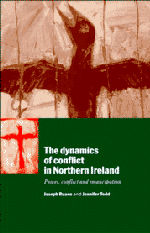Book contents
- Frontmatter
- Contents
- List of figures
- List of tables
- Preface
- 1 Introduction
- 2 Historical formations
- 3 The reconstruction of communal division
- 4 Ideology and conflict
- 5 The dynamics of conflict: politics
- 6 The dynamics of conflict: the economy
- 7 The dynamics of conflict: culture
- 8 The British context of the Northern Ireland conflict
- 9 The Republic of Ireland and the conflict in Northern Ireland
- 10 The international context
- 11 An emancipatory approach to the conflict
- Epilogue
- Appendix
- Bibliography
- Index of names
- Index of subjects
10 - The international context
Published online by Cambridge University Press: 18 December 2009
- Frontmatter
- Contents
- List of figures
- List of tables
- Preface
- 1 Introduction
- 2 Historical formations
- 3 The reconstruction of communal division
- 4 Ideology and conflict
- 5 The dynamics of conflict: politics
- 6 The dynamics of conflict: the economy
- 7 The dynamics of conflict: culture
- 8 The British context of the Northern Ireland conflict
- 9 The Republic of Ireland and the conflict in Northern Ireland
- 10 The international context
- 11 An emancipatory approach to the conflict
- Epilogue
- Appendix
- Bibliography
- Index of names
- Index of subjects
Summary
From the outset, the conflict in Northern Ireland has had an international dimension. International opinion and interventions by international organisations and other governments have influenced the policies of the British and Irish governments and the expectations of the two communities in Northern Ireland. Outside responses have been shaped in part by the perception that the conflict does not fall into a neat category to which international norms and principles of law can unambiguously be applied. We begin by exploring the historical roots of this ‘category problem’ and its implications. We then consider the consequences of the increasing role of the United States and European Union in the conflict.
British–Irish relations in international context
The history of British–Irish relations can be viewed within two quite different comparative frames of reference: as an interface–periphery conflict arising from two competing European state- and nation-building processes, or as a colonial conflict which happens to be in Europe but which is more characteristic of the legacy of European colonialism elsewhere. The comparative frame used has important practical and political consequences. Interface-periphery conflicts are now regulated by recognising existing frontiers, by intergovernmental agreements and the legal protection of minority rights. In contrast, settler–colonial conflicts are resolved by the departure of the colonial power and the acceptance by the settlers of their minority status.
The ambiguities surrounding British–Irish relations have their roots in two interrelated aspects of European development. One is its multipolar nature – the fact that Europe developed as a complex structure of overlapping and interlocking political, economic and cultural power centres. The second is the uneven involvement of the European states in the colonisation of the non-European world.
- Type
- Chapter
- Information
- The Dynamics of Conflict in Northern IrelandPower, Conflict and Emancipation, pp. 266 - 289Publisher: Cambridge University PressPrint publication year: 1996



